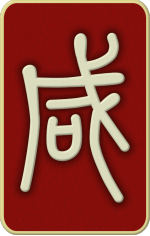
咸 Xián Persuasion (Influence) [hexagram 31]


Lake over Mountain
 Metal element
Metal element
Lunar month: 5 ; Host (controlling) line : 4
The Decision
Persuasion brings untrammelled success as long as steadfast. Marry a young woman. All will be well.
Persuasion from the weak above and the strength below, resonating with each other to form a union, giving mutual fulfillment. The man submits to the woman as in ‘untroubled success as long as steadfast. Marry a young woman. All will be well.' Heaven and earth affect each other and so transform and produce all things. The wise influence the hearts of people to achieve harmony and peace for everyone. These influences reveal the true nature of Heaven and Earth in all things.
咸, 亨, 利贞, 取女吉. Xián, hēng, lì zhēn, qǔ nǚ jí.
彖传: 咸, 感也. 柔上而刚下, 二气感应以相与, 止而说, 男下女, 是以亨利贞, 取女吉也. 天地感而万物化生, 圣人感人心而天下和平, 观其所感, 而天地万物之情可见矣. Tuàn zhuàn: Xián, gǎn yě. róu shàng ér gāng xià, èr qì gǎn yìng yǐ xiāng yǔ, zhǐ ér shuō, nán xià nǚ, shì yǐ hēng lì zhēn, qǔ nǚ jí yě. tiān dì gǎn ér wàn wù huà shēng, shèng rén gǎn rén xīn ér tiān xià hé píng, guān qí suǒ gǎn, ér tiān dì wàn wù zhī qíng kě jiàn yǐ.
The Image
Up on the Mountain stands a Lake. The wise free themselves from self-interest and are open to the influence of others.
象传: 山上有泽, 咸, 君子以虚受人. Xiàng zhuàn: Shān shàng yǒu zé, xián, jūn zǐ yǐ xū shòu rén.
Line Change 1
Persuasion stemming from moving one’s big toe.
‘Moving one’s big toe’ – thoughts are directed elsewhere.
初六, 咸其拇. Chū liù, xián qí mǔ.
象传: 咸其拇, 志在外也. Xiàng zhuàn: Xián qí mǔ, zhì zài wài yě.
Line Change 2
Persuasion from moving one’s lower legs. Misfortune, but if persist then things will turn out well.
‘Misfortune but if persist then things will turn out well’ – by accepting the situation there will be no harm.
六二, 咸其腓, 凶, 居吉. Liù èr, xián qí féi, xiōng, jū jí.
象传: 虽凶居吉, 顺不害也. Xiàng zhuàn: Suī xiōng jū jí, shùn bù hài yě.
Line Change 3
Persuasion from moving one’s thighs but keeping close to what follows. Continuation brings regret.
‘Moving one’s thighs’ – being restless. The mind is on what may follow, holding on is demeaning.
九三, 咸其股, 执其随, 往吝. Jiǔ sān, xián qí gǔ, zhí qí suí, wǎng lìn.
象传: 咸其股, 亦不处也. 志在随人, 所执下也. Xiàng zhuàn: Xián qí gǔ, yì bù chù yě. zhì zài suí rén, suǒ zhí xià yě.
Line Change 4
Perseverance will bring a good outcome and will not be a cause for regret. If agitated only friends will follow your thoughts.
‘Perseverance will bring a good outcome and will not be a cause for regret’ – no harmful influence yet. ‘If agitated’ – the power of persuasion is diminished.
九四, 贞吉, 悔亡, 憧憧往来, 朋从尔思. Jiǔ sì, zhēn jí, huǐ wáng, chōng chōng wǎng lái, péng cóng ěr sī.
象传: 贞吉悔亡, 未感害也. 憧憧往来, 未光大也. Xiàng zhuàn: Zhēn jí huǐ wáng, wèi gǎn hài yě. chōng chōng wǎng lái, wèi guāng dà yě.
Line Change 5
Influence from the back of the neck. No regrets.
‘Influence from the back of the neck’ – the purpose is of little consequence.
九五, 咸其脢, 无悔. Jiǔ wǔ, xián qí méi, wú huǐ.
象传: 咸其脢, 志末也. Xiàng zhuàn: Xián qí méi, zhì mò yě.
Line Change 6
Influence from the mouth.
‘Influence from the mouth’ – just tittle-tattle.
上六, 咸其辅颊舌. Shàng liù, xián qí fǔ jiá shé.
象传: 咸其辅颊舌, 滕口说也. Xiàng zhuàn: Xián qí fǔ jiá shé, téng kǒu shuō yě.
The full set of 64 English translations is available in our new book 'Book of Changes - Deciphered' ➚.